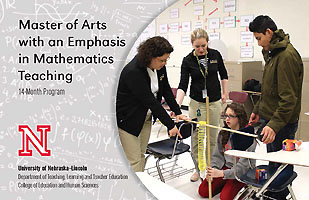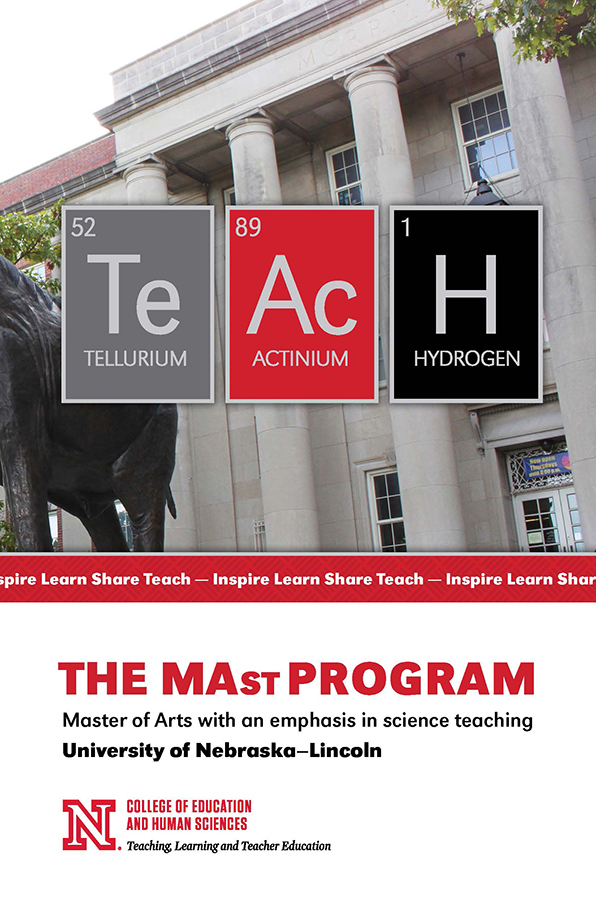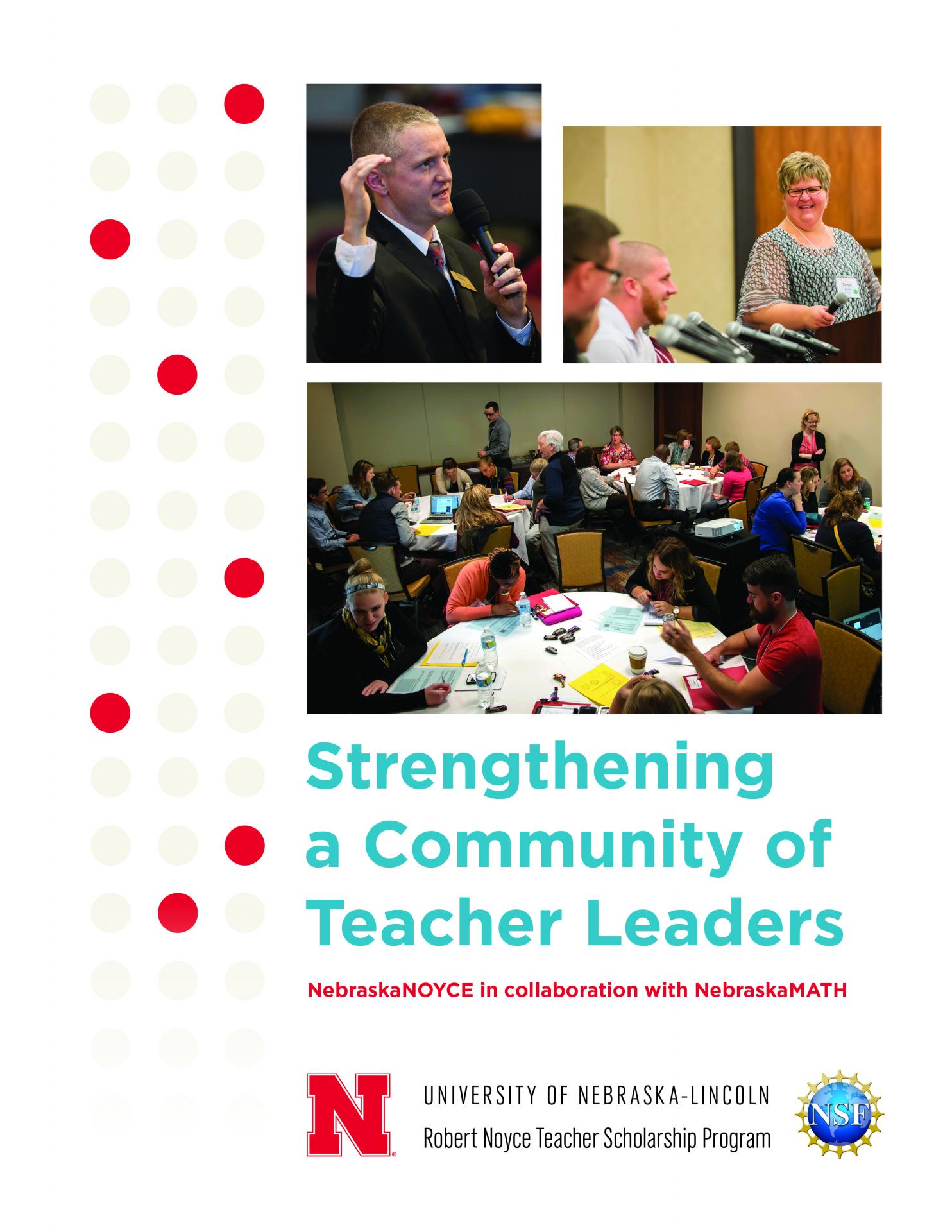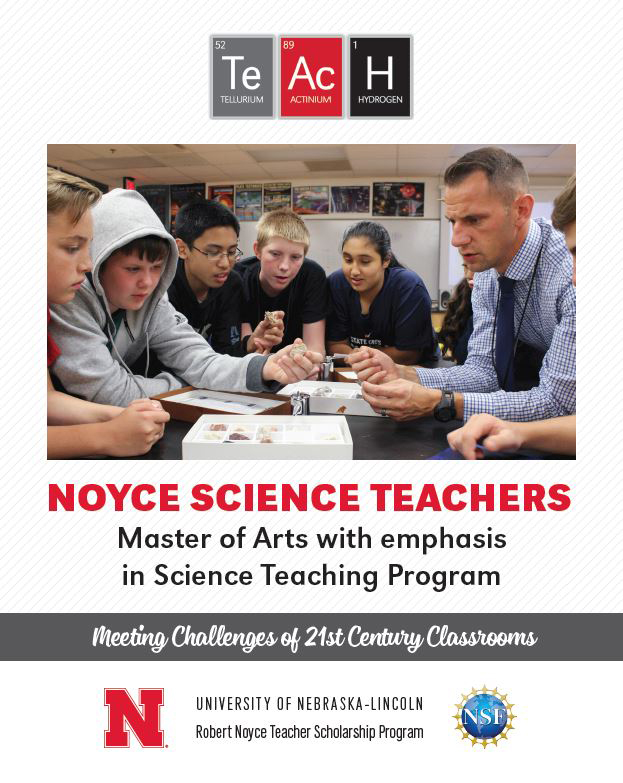Love math and science? Teach it!

New Research Grant to Study Trajectories of Teacher Leadership
A three-year, $1.5 million National Science Foundation (NSF) grant awarded to Nebraska (PI Wendy Smith), University of Kentucky (PI Brett Criswell), University of South Carolina (PIs Jan Yow and Christine Lotter), and Stony Brook University (PI Greg Rushton) in 2018 will be used to study teacher leadership trajectories. The overarching goal of this collaborative research project is to contribute to the currently-limited understanding of STEM teacher leadership by thoroughly examining the influences of teacher leadership development on the persistence and professional trajectories of Noyce Master Teaching Fellows (MTFs).
T-Lead will gather data related to the nature and structure of Noyce MTF programs, the professional trajectories of participating MTFs, the school contexts in which the MTFs operate, and the leadership activities in which they engage. This data set will allow the project team to address two main research goals:
- Determine the impact of the professional learning models used in the various Noyce projects on the professional identities and trajectories of participating MTFs, and look for patterns in the features of those models that may be correlated with teacher persistence, and
- Explore how different contextual factors (e.g. STEM teaching responsibilities, school culture), professional networks, and leadership opportunities shape the decisions of MTFs to remain in classroom roles during and/or after the Noyce program.
The data will support initial conversations around the opportunities in K-12 systems that engage classroom teachers as leaders, and what are sustainable, scalable models that do or could exist to provide such opportunities in ways that positively affect teacher persistence. In summary, this Noyce Track 4 Research grant will further the mission of this funding program by determining what the structure and mechanisms of STEM teacher leader efforts are that support teacher persistence in high-need schools.
The T-Lead project will study eight Noyce MTF projects from across the country that include both in-progress and completed professional learning experiences dedicated to the development of STEM teacher leaders. Those projects involve 174 MTFs from across the K-12 spectrum, all of whom have STEM teaching responsibilities. The results of this project, which will be disseminated through numerous local, state and regional outlets (e.g. local teacher leadership efforts, state meetings and conferences and national research and STEM teacher educator conferences), will help future Noyce and related projects better design professional learning for teacher leaders and better understand the unique challenges of STEM teachers that may increase their persistence.
Strengthening a Community of Teacher Leaders
Since 2011, Nebraska's Noyce Master Teaching Fellows and Teaching Fellows have engaged in a wide variety of teacher leadership as mathematics teachers in high-need schools and districts across the state. From becoming math coaches and leading professional development for peers, to giving presentations at national conferences and chairing curriculum committees, the 30 MTFs and 13 TFs demonstrate through their accomplishments the accumulation of efforts by the Center for Science, Mathematics and Computer Education to form school-university partnerships that can provide opportunities for teacher leadership. The NebraskaNOYCE grant was funded by the National Science Foundation, as was a Phase II grant to allow us to continue to study these remarkable Noyce teachers. Contact us to receive a copy of this booklet in the mail or click on the image to download a PDF.

Stories from MAmt Graduates
They love math, and they now know how to teach it! This publication about the 14-month Master of Arts with an emphasis in Mathematics Teaching (MAmt) tells the story of this degree program and the well-prepared teachers who comprise the first two cohorts of graduates from the University of Nebraska-Lincoln’s Department of Teaching, Learning and Teacher Education (TLTE). NebraskaNOYCE, an NSF grant, has played a key role in supporting the development of the MAmt.

Phase II Noyce science grant brings more scholarships
A three-year, $799,890 National Science Foundation (NSF) grant awarded to Nebraska will be used to help meet the growing need for high school and middle school science teachers. The Phase II Robert Noyce Teacher Scholarship grant will provide scholarships for qualifying graduate students to participate in the Master of Arts with emphasis in science teaching (MAst) program. The 14-month program prepares students to teach middle and high school science. Next spring, the College of Education and Human Sciences will offer 10 Noyce scholarships at $15,000 apiece, and the Phase II grant will then provide 30 additional $16,000 scholarships over the next three to four years. In total, the MAst program will support 40 additional students seeking to become science teachers. The program begins in May of each year with graduation in August of the following year. The deadline to apply for the next MAst cohort is March 1, 2018.
Meeting Challenges of 21st Century Classrooms
To meet the state’s and the nation’s need for more highly qualified science teachers, the 14-month Master of Arts with emphasis in science teaching (MAst) program was established in the College of Education’s Department of Teaching, Learning, and Teacher Education at the University of Nebraska-Lincoln, along with a Robert Noyce, Track I, Phase I grant from the National Science Foundation, awarded in 2010. This report presents a summary of the accomplishments of this Noyce grant, in which 60 post-baccalaureate science majors and professionals were provided with Noyce stipends to become science teachers. The MAst program is now in its sixth year, producing an average of 10 new science teachers per year. The project team, led by Dr. Elizabeth Lewis, was also awarded a second Noyce grant in 2015 to support 30 more individuals to become science teachers along with funding to continue to research the practices of beginning science teachers. The MAst program engages science professionals in a research-informed program of study that supports them in developing the knowledge, skills, and dispositions necessary to meet the challenges of the modern American secondary science classroom.

